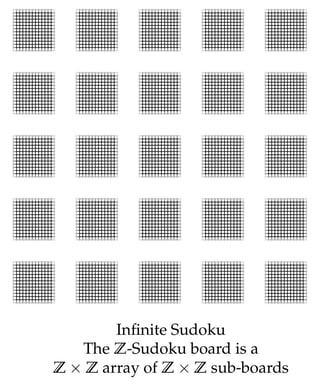In the general-size square Sudoku board, you have an $\kappa\times\kappa$ array of $\kappa\times\kappa$ local blocks for some (possibly infinite) cardinal $\kappa$. Every location on the Sudokou board has an address $(\alpha,\beta)$ in its local block, and the local block itself has coordinates $(\gamma,\delta)$. Thus, every location on the Sudoku board is specified by four coordinates: $$(\gamma,\delta,\alpha,\beta).$$$$(\alpha,\beta,\gamma,\delta).$$ TheThis is (local address, global block coordinates). The boundaries between the local boards play no meaningful role. Every row, column and local block has size $\kappa^2$.
A Sudoku solution is a function $f:(\lambda\times\kappa)\times(\kappa\times\lambda)\to L$$f:(\kappa\times\lambda)\times(\lambda\times\kappa)\to L$, where $L$ is the set of labels (of size $\lambda\times\kappa$) that obeys the three requirements:
- Every row is a bijection with $L$. So $f(\gamma,\delta,\alpha,\beta)$$f(\alpha,\beta,\gamma,\delta)$ is a bijection, if you fix $\delta<\kappa$ and $\beta<\lambda$.
- Every column is a bijection with $L$. So $f(\gamma,\delta,\alpha,\beta)$$f(\alpha,\beta,\gamma,\delta)$ is a bijection, if you fix $\gamma<\lambda$ and $\alpha<\kappa$.
- Every local board is a bijection with $L$. So $f(\gamma,\delta,\alpha,\beta)$$f(\alpha,\beta,\gamma,\delta)$ is a bijection, if you fix $\gamma<\lambda$ and $\delta<\kappa$.
Note that if $G$ is a group of size $\lambda$ and $H$ is a group of size $\kappa$, then we can use these groups as location coordinates, and define $f(g,h,h',g')=(gg',hh')$$f(h,g,g',h')=(gg',hh')$, taking $L=G\oplus H$ as the set of labels. This is a solution, because if you fix $h$$g$ and $g'$$h'$, it is a bijection; and similarly if you fix $g$$h$ and $h'$$g'$, or if you fix $g$$g'$ and $h$$h'$. So every assymmetric Sudoku board has a solution arising in this way. This answers a question asked by Gerhard in a comment on an earlier post.
In the group example, this extra condition corresponds to fixing $g'$$g$ and $h'$$h$, and this shows that any Sudoku solution arising from groups will indeed obey the extra requirement. However, one can easily find Sudoku solutions not fulfilling the extra requirement, and so these solutions cannot arise from groups in the way I described (e.g. perhaps the operation that they define is not associative). One can also find infinite solutions without the extra requirement, since the argument on my blog shows that any finite position not yet violating the Sudoku rules extends to a full solution on a countably infinite board. So one could start with two labels violating the extra requirement and extend it.

